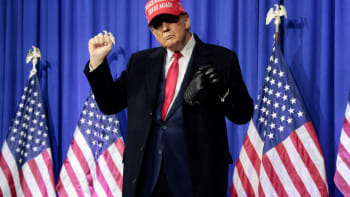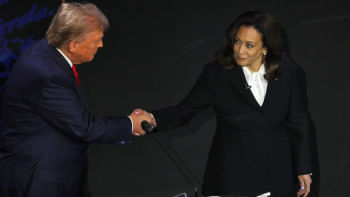Inflation drags down Kamala Harris

Former President Donald Trump won the race again defeating the Democratic Party nominee Kamala Harris by a convincing margin, both in the Electoral College count and share of popular votes. The election platform offered by Harris had its strengths, particularly in the area of healthcare and abortion rights. So why did Kamala Harris lose in such a big way? The post-mortem of the Harris debacle is just beginning, and the list of her failures is long but I will focus only on one area: inflation and the economy.
It was clear from the beginning of this presidential race that the biggest thorn in Harris's side was the poor economic record of the Biden-Harris administration. The last four years saw unprecedented inflation compounding the post-pandemic misery for poor and lower-middle-class families. Kamala Harris, who claimed she was a successful public prosecutor, failed to convince the American voters that she could handle either the country's economic or the immigration crises that were supreme in the minds of the majority. She never mentioned inflation nor the complications brought on by the "open border" immigration policy pursued by the Biden-Harris administration.
Harris lost for two reasons: the first one is that the voters, regardless of their party affiliation, harboured the perception that the Biden-Harris regime caused a lot of damage to the economy during the last four years.
Secondly, even her supporters acknowledge that Kamala Harris was unwilling to consider the working class's sorry plight or place economic policy at the forefront of the democratic agenda.
The Trump and Harris campaigns offered two very sharp views of the US economy. Two days before the election, The New York Times, which supported Harris, ran a story with the headline, "Trump and Harris Offer Night-and-Day Views of the Economy" contrasting the two candidates' positions. It acknowledged that the voters were asking who was addressing inflation and lamented that Kamala Harris and her allies had finally concentrated their spending on addressing the economy. But it was too late and too little.
The Democratic platform received several endorsements from the country's top economists, including 23 Nobel Prize-winning economists. But, the candidate did not address the pocketbook issues during her campaign or ever bring up the key concerns that pollsters identified, including inflation, the rising cost of mortgages, and declining real wages. One might also mention immigration, and law and order problems.
In early October, Kamala Harris was asked by the co-hosts of the show The View whether she would have done anything differently than President Biden, and she responded, "Not a thing comes to mind," before coming back to the question later, adding that she plans to appoint a Republican to her cabinet if elected. She did mention during the interview, "Now our biggest challenge is to lower costs, costs that were rising even before the pandemic, and that are still too high."
Undoubtedly, the US economy saw some bad times after Biden-Harris took charge in 2021, but during the last few months, the economy has been moving in the right direction. Inflationary pressures were controlled, thanks to the policies adopted by the Federal Reserve Bank (Fed). The macroeconomic indicators showed that the Fed had achieved its "soft-landing" goal with lower inflation and decent GDP growth. The labour market showed signs of cooling, and while the unemployment rate was inching up, it was low. And the Fed just started to cut interest rates. So, things were getting better on the economic front. The US government said on October 24 that the US economy grew at a healthy 2.8 percent annual rate in the third quarter. Consumer confidence has been improving, though it has yet to recover to the levels that prevailed before the pandemic fully.
Many economists say Vice President Kamala Harris's economic proposals would do more to help everyday Americans than the agenda put forward by former President Donald J Trump. One model suggests that her package would boost post-tax income for the poorest Americans by 18 percent by 2026, much more than the 1.4 percent bump Mr Trump's ideas would offer.
The 23 Nobel Prize-winning economists called Trump's economic agenda "counterproductive" and warned that it "will lead to higher prices, larger deficits, and greater inequality."
The puzzle is, even if we agree that the economy is the number one factor and that inflation is going down, how did Kamala Harris get defeated with a booming economy?
The answer is that the Harris campaign never understood the American concerns about their pocketbook nor did it demonstrate she understood the harm done by the Biden administration. Loyalty is good but you need to be smart enough to recognise your limitations and part ways with your mentor. Harris just could not figure out how to overcome the public distrust generated by inflation which rightly or wrongly blamed their administration and economic policies. The Biden-Harris administration embarked on some misguided economic policy with $1.9 trillion allocated to the American Rescue Plan and later another $891 million to the Inflation Reduction Act. Back in 2021, at the beginning of the Biden-Harris administration, Lawrence Summers, a former secretary of the Treasury under Clinton, warned that his party was behaving irresponsibly.
A final word. What economists think of inflation in abstract terms and how it affects people are very different. Inflation is closely tied to the cost of living, and while inflation may come down, the cost of living seldom does.
We all know that concerns and uncertainty affect economic perception. And they are vented through votes and by seeking change. "Concrete, specific political promises are often not as powerful in the electorate as emotional appeals that tap into fears and anxieties," said Julian Zelizer, a professor of political history at Princeton University.
A paper by Nobel-prize-winning economist Robert J Shiller, entitled "Why Do People Dislike Inflation?" provides a clue why people hate inflation. Also, even though inflation is low now, people are nervous that Biden ignored it in 2021 and trust Trump more. That is because inflation was low during the first Trump presidency.
Dr Shafiq Islam, a former chief economist with Credit Suisse and division chief of the New York Fed, concedes that the high cost of living and unchecked illegal immigration tanked the Harris campaign. He adds, "The spike in inflation didn't result from Biden's policies. Inflation was even higher in Europe." According to him, the culprit was the rapid rise in food, commodity, and energy prices; plus the supply chain bottlenecks throughout the world. It was not Biden's bad karma, "but Republicans repeated the false narrative."
One can hope that President Trump will get the economy in shape and confront and solve the cost-of-living problems.
Dr Abdullah Shibli is an economist and works for Change Healthcare, Inc., an information technology company. He also serves as senior research fellow at the US-based International Sustainable Development Institute (ISDI).
Views expressed in this article are the author's own.
Follow The Daily Star Opinion on Facebook for the latest opinions, commentaries and analyses by experts and professionals. To contribute your article or letter to The Daily Star Opinion, see our guidelines for submission.

 For all latest news, follow The Daily Star's Google News channel.
For all latest news, follow The Daily Star's Google News channel. 











Comments